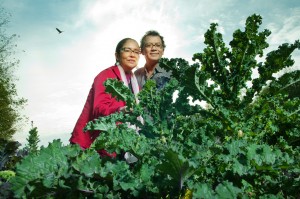
A thicket of kale surrounds researcher Eduardo Jovel and PhD student Alannah Young Leon at UBC Farm. Photo by Martin Dee
Consider the Urban Aboriginal Community Kitchen Garden Project, which is organized by the Vancouver Native Health Society. Hundreds of participants – many from Vancouver’s Downtown Eastside – regularly make the trek to UBC Farm which involves carpooling or taking the bus to UBC’s south campus. They plant, weed and harvest crops, preparing communal meals and sharing extra produce with those in need.
Many participants undergo a sense of renewal by connecting to others and to the land, says Assoc. Prof. Eduardo Jovel, Director of Indigenous Research Partnerships at the Faculty of Land and Food Systems.
Jacqui Adams says her time at the Urban Aboriginal Community Kitchen Garden Project is nothing less than restorative. “When we came back from residential school in the summertime, my mom always had a garden. There is a lot of stuff that I forgot about, that I am remembering. It restores my soul.”
Also at UBC Farm are the Maya in Exile Garden, the Institute for Aboriginal Health Teaching and Learning Research Garden and the Musqueam Indian Band Garden. Overall, more than 300 community members and students are involved in these four gardens.
“As a 24-hectare teaching and learning farm, UBC Farm offers a physical and cultural space where people can explore sustainability issues, including Aboriginal health and traditional ecological knowledge,” says Jovel, whose research areas include ethnobotany, aboriginal health, natural product chemistry and food security.
Jovel says UBC Aboriginal faculty and academic units, along with community partners, are developing an interdisciplinary community service learning (CSL) field school at the Center for Sustainable Food Systems at UBC Farm where students can engage further with Aboriginal communities. Curricula will address issues such as intellectual property, culture, research ethics and traditional protocols.
UBC is a recognized leader in CSL, which encourages students to apply discipline-specific knowledge in resolving real-life challenges, he says. Last year, close to 2,600 UBC students engaged with non-profit organizations, public schools and businesses in CSL projects as diverse as analyzing living wage policies and supporting children’s literacy.
“When working with indigenous partners, we advocate a common protocol that follows the four ‘R’s’ – respect, responsibility, reciprocity and relevance,” says Jovel, a Pipil from El Salvador who is interested in how indigenous worldviews intersect with western science.
One step toward this vision is an online video library that Jovel’s team will launch this year to connect students with Aboriginal initiatives at UBC Farm. The videos document the often profound journey of participants, he says.
UBC’s Institute of Aboriginal Health (IAH) also hosts popular monthly “Feast Bowl” events at the First Nations House of Learning, which feature guest speakers and lunch with UBC Farm-fresh ingredients, attracting upwards of 100 guests. As well, the IAR facilitates a summer workshop series, which recently looked at traditional medicines and how to prepare tobacco – harvested from UBC Farm – for ceremonial use.
“We want to demonstrate that Aboriginal learning involves multi-generational education, a holistic, experiential, spiritual and communal process,” says Jovel.
He says these values support UBC’s academic plan for south campus, which envisions UBC Farm as an immersive environment for globally significant research on key sustainability issues that include green technology innovations, organic agriculture and clean energy. “Our work also advances the objectives of the Aboriginal Strategic Plan in outreach to local indigenous communities, curricula development, and public programming.”